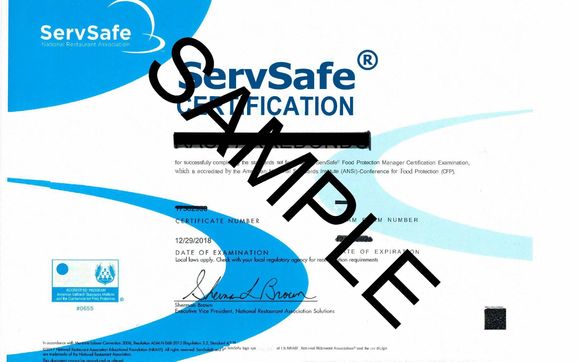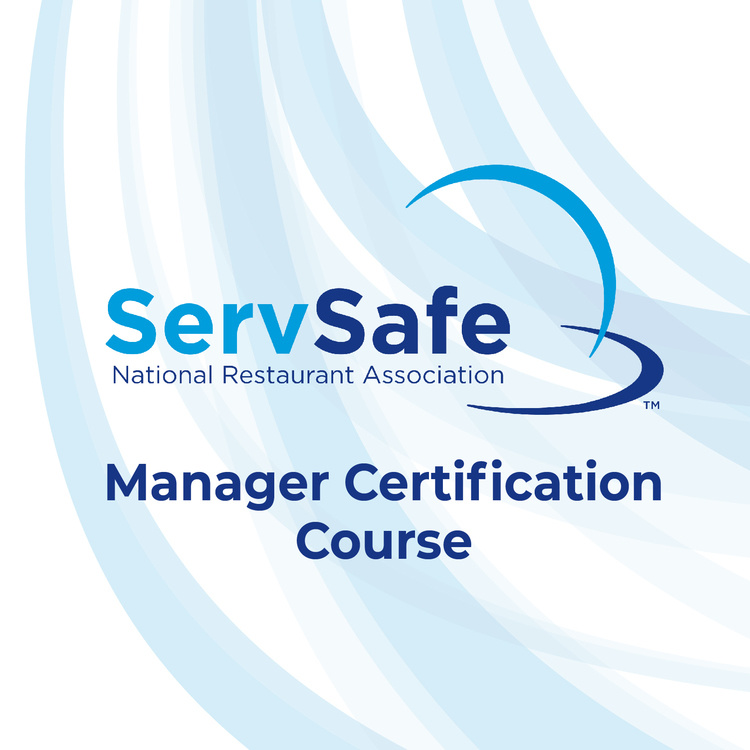Achieve Success With Comprehensive Food Supervisor Qualification
In the highly managed food sector, accomplishing success often hinges on obtaining thorough Food Manager Qualification. This credential not just symbolizes a person's efficiency in essential food safety and security techniques however also boosts their professional trustworthiness and profession potential customers.
Importance of Food Manager Certification

By obtaining this qualification, food supervisors demonstrate their dedication to high quality and safety criteria, promoting customer depend on and confidence (ServSafe Manager). In an industry where conformity with health laws is vital, having accredited supervisors can substantially decrease the chance of violations and the linked penalties
In addition, certification programs are commonly developed to cover crucial topics such as food safety and security laws, hygiene techniques, and worker training techniques. As a result, accredited supervisors are better furnished to lead their groups effectively, making sure that all personnel comprehend their duties in maintaining a risk-free food atmosphere.
Inevitably, Food Supervisor Certification not only boosts private job prospects but likewise adds to the total success of foodservice procedures, making it an indispensable possession in today's affordable market. Purchasing this qualification is an aggressive strategy to safeguarding public health and achieving operational quality.
Trick Subjects Covered in Qualification
Numerous key topics are encompassed within the Food Manager Certification curriculum, giving a comprehensive foundation for reliable food safety and security administration. One main focus is the principles of food safety and security, which consist of recognizing foodborne ailments, their causes, and prevention techniques. Participants learn more about proper food handling techniques, consisting of risk-free storage, cooking, and offering methods to lessen contamination risks.
Another essential subject is individual hygiene, stressing the relevance of staff member health and wellness and hygiene methods. This section covers handwashing methods, proper clothes, and policies relating to disease and injury in the workplace. In addition, the curriculum discovers the important control points in food production, such as temperature control, cross-contamination prevention, and cleansing and disinfecting treatments.
Governing conformity is also addressed, supplying a review of pertinent neighborhood, state, and federal food safety legislations and standards. Reliable interaction and training strategies are emphasized, enabling managers to foster a culture of food safety within their teams.
Benefits for Profession Development

Achieving Food Manager Certification offers significant advantages for people looking for to advance their occupations in the food solution sector. This accreditation not just shows a commitment to food security and quality but also placements specialists as educated leaders within their companies.
Having this credential improves an individual's employability, as several companies focus on licensed candidates when hiring for supervisory roles. It mirrors a comprehensive understanding of food security policies, which is essential in an area where conformity is critical. Qualified food managers are frequently viewed as useful assets, allowing them to command greater salaries and much better job possibilities.

Eventually, acquiring Food Manager Accreditation encourages people to organize their jobs, increase their specialist networks, and seek management duties that line up with their aspirations within the dynamic food service industry.
Compliance and Governing Insights
Browsing the complex landscape of conformity and governing needs is crucial for food solution specialists. Abiding by regional, state, and federal policies not only ensures the safety and quality of food offered however likewise secures organizations from lawful consequences and economic fines. Comprehending the Fda (FDA) standards, this page the Danger Analysis Critical Control Factor (HACCP) principles, and ServSafe standards is extremely important for keeping compliance.
Food supervisors need to be fluent in various regulations, consisting of those relating to food storage space, sanitation, and prep work. Normal training and updates on regulatory adjustments help managers remain educated and prepared for examinations. Furthermore, paperwork is a critical aspect of compliance; keeping exact documents of food temperatures, cleaning routines, and worker training can dramatically reinforce a facility's defense during audits.
Furthermore, promoting a culture of compliance within the workplace encourages employees to prioritize food safety and security - Safe Serve you can try this out Manager. This aggressive approach not just boosts the reputation of the facility yet likewise develops consumer trust. Ultimately, a comprehensive understanding of conformity and governing insights empowers food solution experts to produce a safe and effective dining experience for all clients
Steps to Get Qualification
Just how can hopeful food managers properly acquire their accreditation? The process starts with choosing a certified certification program that fulfills nationwide and local governing standards. Numerous organizations, such as the National Dining Establishment Association or ServSafe, offer acknowledged courses.
As soon as a program is chosen, prospects ought to sign up and complete the called for training, which usually covers essential subjects such as food safety, cleanliness, and correct handling methods. It is crucial to actively take part in the coursework, as these foundational principles are vital for success in the area.
After completing the training, prospects should prepare for the accreditation exam. Making use of research study overviews, practice tests, and testimonial sessions can considerably boost understanding and retention of the material.
Upon feeling adequately prepared, prospects can arrange their exam through the selected qualification body. The examination format may vary, but it normally consists of multiple-choice questions that evaluate expertise of food safety and security practices.
Final Thought

In the highly managed food market, achieving success usually hinges on obtaining detailed Food Manager Accreditation.Several crucial topics are included within the Food Supervisor Accreditation educational program, offering a comprehensive foundation for reliable food safety monitoring.Food managers should be fluent in various guidelines, including those pertaining to food hygiene, storage space, and preparation.Just how can aspiring food managers successfully get their certification?In final thought, detailed Food Supervisor Qualification plays a critical function in improving food safety and security expertise and handling techniques among sector specialists.